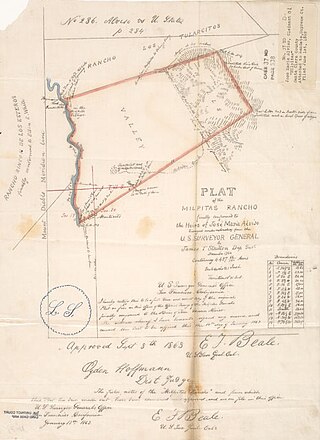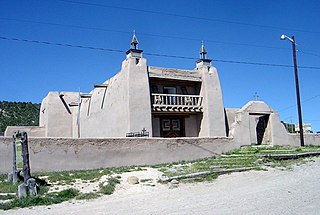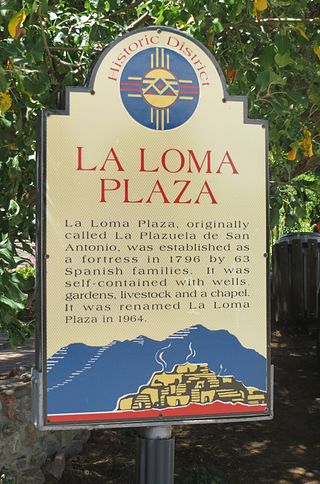
Las Vegas is a city in and the county seat of San Miguel County, New Mexico, United States. Once two separate municipalities, both were named Las Vegas—West Las Vegas and East Las Vegas ; they are separated by the Gallinas River and retain distinct characters and separate, rival school districts.

Olvera Street, commonly known by its Spanish name Calle Olvera, is a historic pedestrian street in El Pueblo de Los Ángeles, the historic center of Los Angeles. The street is located off of the Plaza de Los Ángeles, the oldest plaza in California, which served as the center of the city life through the Spanish and Mexican eras into the early American era, following the Conquest of California.

Old Las Vegas Mormon Fort State Historic Park is a state park of Nevada, containing the Old Mormon Fort, the first structure built by people of European heritage in what would become Las Vegas fifty years later. In present-day Las Vegas, the site is at the southeast corner of Las Vegas Boulevard and Washington Avenue, less than one mile north of the downtown area and Fremont Street. This is the only U.S. state park located in a city that houses the first building ever built in that city. The fort was listed on the National Register of Historic Places on February 1, 1972. The site is memorialized with a tablet erected by the Church of Jesus Christ of Latter-day Saints in 1997, along with Nevada Historical Marker #35, and two markers placed by the Daughters of Utah Pioneers.

Old Town is the historic original town site of Albuquerque, New Mexico, for the provincial kingdom of Santa Fe de Nuevo México, established in 1706 by New Mexico governor Francisco Cuervo y Valdés. It is listed on the New Mexico State Register of Cultural Properties as the Old Albuquerque Historic District, and is protected by a special historic zoning designation by the city. The present-day district contains about ten blocks of historic adobe buildings surrounding Old Town Plaza. On the plaza's north side stands San Felipe de Neri Church, a Spanish colonial church constructed in 1793.

Las Trampas or just Trampas, is a small unincorporated town in Taos County, New Mexico. Founded in 1751, its center retains the original early Spanish colonial defensive layout from that time, as well as the 18th-century San José de Gracia Church, one of the finest surviving examples of Spanish Colonial church architecture in the United States. The village center was designated a National Historic Landmark District in 1967.

Kyle Ranch or Kiel Ranch, was one of the earliest ranches established in Nevada's Las Vegas Valley. Founded by Conrad Kiel in 1875, today the location of the former ranch is in North Las Vegas, where the city maintains the remnants of the site as the "Kiel Ranch Historic Park." The original adobe structure, one of the oldest buildings in Las Vegas, a wooden shed known as the "Doll House," and the cemetery are all that remain after loss of buildings through fire and neglect. Also within the park is an artesian well and a small wetlands, a reminder of what drew travelers and early settlers to the area. Presently the ranch's location is memorialized with Nevada Historical Marker number 224.

Rancho Milpitas was a 4,458-acre (18.04 km2) Mexican land grant in Santa Clara County, California. The name comes from the Nahuatl "milpan", a term meaning "in the field". Therefore, Milpitas could be translated as "little fields". The grant included what is now the city of Milpitas.

San Juan Bautista State Historic Park is a California state park encompassing the historic center of San Juan Bautista, California, United States. It preserves a significant concentration of buildings dating to California's period of Spanish and Mexican control. It includes the Mission San Juan Bautista, the Jose Castro House, and several other buildings facing the historic plaza. It became a state park in 1933 and was declared a National Historic Landmark in 1970. It is also a site on the Juan Bautista de Anza National Historic Trail.

The San Jose de Gracia Church, also known as Church of Santo Tomas Del Rio de Las Trampas, is a historic church on the main plaza of Las Trampas, New Mexico. Built between 1760 and 1776, it is one of the least-altered examples of a Spanish Colonial Pueblo mission church, with adobe walls rising 34 feet (10 m) in height. It was declared a National Historic Landmark in 1970.

San Estévan del Rey Mission Church is a Spanish mission church in the Roman Catholic Diocese of Gallupon the Acoma Pueblo Reservation in western New Mexico. Built between 1629 and 1641, it is one of the finest extant examples of hybrid Spanish Colonial and Puebloan architectural styles. It was named for Saint Stephen I of Hungary. The church was declared a National Historic Landmark in 1970, and is listed on the National Register of Historic Places. It remains a mission church and is part of the parish of San José de la Laguna in Laguna, New Mexico.

El Pueblo de Los Ángeles Historical Monument, also known as Los Angeles Plaza Historic District and formerly known as El Pueblo de Los Ángeles State Historic Park, is a historic district taking in the oldest section of Los Angeles, known for many years as El Pueblo de Nuestra Señora la Reina de los Ángeles del Río de Porciúncula. The district, centered on the old plaza, was the city's center under Spanish (1781–1821), Mexican (1821–1847), and United States rule through most of the 19th century. The 44-acre park area was designated a state historic monument in 1953 and listed on the National Register of Historic Places in 1972.

The Governor Bent House is the historic home of Governor Charles Bent who served as the first United States territorial governor of New Mexico.

The Presbyterian Mission Church in Las Vegas, New Mexico is a historic church at 1413 Chavez Street. It was built during 1871-73 and was added to the National Register of Historic Places in 1978.

The La Loma Plaza Historic District is a historic neighborhood in Taos, New Mexico that was listed as a National Register of Historic Places in 1982.

The Plaza Hotel is a hotel in Las Vegas, New Mexico. It was opened as an upmarket hotel for the booming town in 1882. Since then it has had a complex history. It is listed in the National Register of Historic Places as a contributing property in the Las Vegas Plaza historic district.

The Adele Ilfeld Auditorium, on the campus of New Mexico Highlands University in Las Vegas, New Mexico, is a brownstone Romanesque Revival structure built during the seventeen years from 1914 to 1931. It was listed on the National Register of Historic Places in 1980.
The Charles Ilfeld Memorial Chapel, located in the Masonic Cemetery at Colonias & Romero in Las Vegas, New Mexico, was built in 1912. It was listed on the National Register of Historic Places in 1985.
The C. N. Cotton Warehouse, at 101 N. Third Street in Gallup, New Mexico, United States, is a structure built around 1880. It has also been known as Associated Grocers. It was listed on the National Register of Historic Places in 1988.

The Distrito de las Escuelas is a historic district in Las Vegas, New Mexico. It was listed on the National Register of Historic Places in 1980. The listing included 44 contributing buildings on 12 acres (4.9 ha)

The Castañeda Hotel is a historic railroad hotel located in Las Vegas, New Mexico. It was built in 1898 and 1899 by the Atchison, Topeka and Santa Fe Railway, and was operated by the Fred Harvey Company until 1948. After being mostly vacant for many years, the hotel was restored and reopened in 2019. The Castañeda was listed on the New Mexico State Register of Cultural Properties in 1974 and the National Register of Historic Places in 1979 as a contributing property in the Railroad Avenue Historic District. It is located adjacent to the Las Vegas railroad station.




















